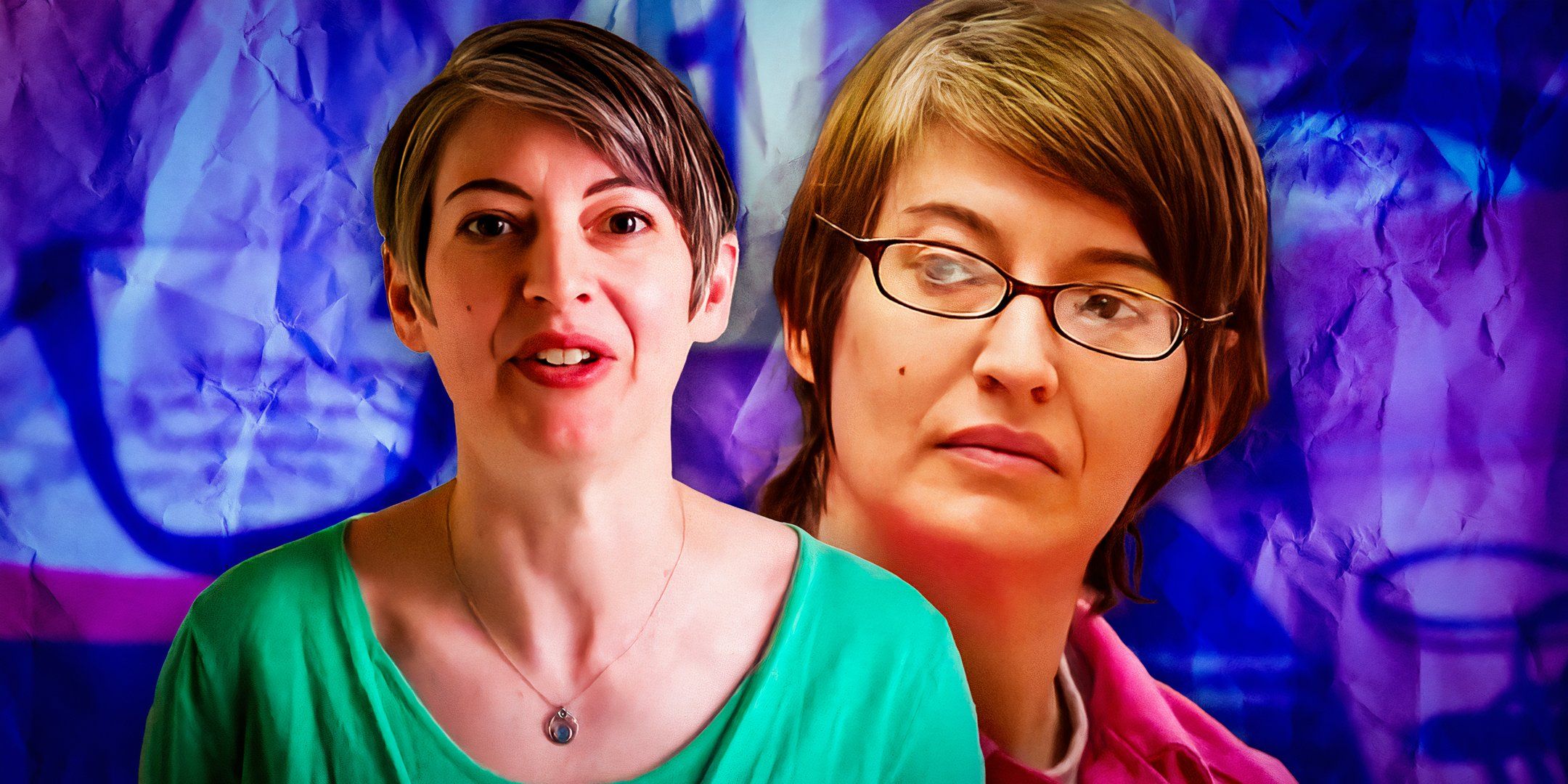6 Biggest Details Netflix’s Tell Me You Love Me Leaves Out From The True Story Of Anna Stubblefield’s Case
Summary Tell Them You Love Me is a documentary about Anna Stubblefield's relationship with Derrick Johnson, exploring the complex case involving consent, race, and assumptions about the disabled.
The documentary leaves out some details about the trial and Anna's personal life.
For example, the troubles of Anna's previous marriage are alluded to, but many details about what went wrong in their relationship are left out.
Produced by documentarian Louis Theroux and directed by Nick August-Perna, Tell Them You Love Me provides plenty of information about the case against Anna Stubblefield, but still leaves out a few key details. Tell Them You Love Me is a shocking documentary about Anna's controversial relationship with Derrick Johnson, a non-verbal man she helped through the use of facilitated communication. Rather than the information being spread over a few episodes, Tell Them You Love Me details the complex issues within the case in an hour and 42-minute runtime. As a result, a few details are briefly mentioned or are excluded entirely.
True-crime documentaries are rarely easy to present due to the inherent complexities of crime content itself, but it gets further complicated with a case such as the one involving Anna. On top of conversations about consent, race, and assumptions about the disabled are also presented as key factors in the case. Court testimony and interviews with Derrick's family in Tell Them You Love Me go in depth about such factors. However, as much as Anna gets to share her perspective in the documentary, there are some details about the trial and her personal life that are left out of the Netflix documentary.
Related Where Anna Stubblefield & Derrick Johnson Are Today After Tell Them You Love Me’s Controversial Case After the events of the documentary Tell Them You Love Me, Anna Stubblefield and Derrick Johnson lead very different lives in different spheres.
6 Anna's Plea Deal
One of the few details grazed over in Tell Them You Love Me was the exact details of Anna's overturned conviction. The documentary mentions her early release but doesn't specify her lesser charge. Anna's first conviction was of two counts of first-degree aggravated sexual assault and she was sentenced to 12 years in prison.
This result comes after the jury found Derrick could not consent to the relationship between himself and Anna and the latter was abusing her power as his facilitator. However, only two years into her 12-year sentence, a three-judge panel overturned her conviction. In a plea deal, Anna pleaded guilty to a third-degree charge of aggravated criminal sexual contact and was released from prison.
It became clear that Anna did not receive a fair trial due to the amount of inadmissible evidence that gave the defense few resources to back up their claims. By the time the trial began, facilitated communication had already been largely debunked due to multiple studies that brought into question how much of a role facilitators play in the typed-out answers. Therefore, because much of the defense's evidence involved the use of facilitated communication, it was excluded.
5 Rosemary Crossley Videotaped Derrick For Evidence
The evidence was intended to prove Derrick's ability to consent.
A strong piece of evidence for the defense, that was ultimately unable to be used in court, was the recordings by Dr. Rosemary Crossley. Over three days, Rosemary, who is briefly featured in Tell Them You Love Me, videotaped her evaluation of Derrick. The purpose of the evaluation was to determine whether Derrick had "communicative intent."
Rosemary used facilitated communication during this process, but she claims the results from the device have little to do with her final opinion of Derrick's abilities. Rosemary is best known within her field of work for being one of the first advocates for facilitated communication. Of the people Rosemary helped communicate, one of the more well-known individuals is Anne McDonald, as mentioned in the documentary.
Seeing how successful Anne was using facilitated communication, Rosemary proudly pushed for the method of communication. However, Rosemary still had some doubts about the tool's accuracy, just as others did. In a memoir she wrote about the experience, Rosemary confessed to concerns over whether she was subconsciously taking over Anne's answers. Yet, her doubts subsided when Anne began typing inside jokes and stories that Rosemary was not informed of.
4 Anna And Her Husband Went To Couples Counseling
Anna's relationship with Derrick was brought up.
Image By Netflix
In Tell Them You Love Me, Anna makes it known that her marriage was rocky. The frail state of her marriage was also made clear to both Derrick and his family when the two shared the details of their relationship with them. Tell Them You Love Me alludes to the trouble in their relationship, but the documentary doesn't detail what transpired in their marriage following a search that took place in their home.
Anna and her now ex-husband Roger's marriage took a bigger hit after her relationship with Derrick came to light and the couple went to counseling. A testimony from Roger at a pretrial hearing revealed that their therapist told Anna she "must stop dwelling on this relationship with Derrick." Things were looking promising as Anna hadn't had contact with Derrick for weeks, but the hope Roger had of Anna moving on went away fairly quickly.
Roger eventually got hold of a document that detailed Anna and Derrick's relationship and sent it to the Johnson family. Roger stated he felt compelled to do so after he found a search for real estate listings on the home computer and realized Anna had no intention of staying in their marriage.
3 John Tested The Results Of Facilitated Communication
He asked Derrick questions that Anna wouldn't know the answer to.
Along with Anna, two individuals who are present throughout the documentary are Derrick's mother, Daisy, and his brother, John. Anna recalls in Tell Them You Love Me the period following the announcement of her and Derrick's relationship with the Johnson family. During this time, Daisy didn't respond to Anna's calls and she wasn't allowed to speak to or see Derrick.
Tell Them You Love Me mentions Anna's attempt to reach out to Derrick without his family's knowledge, but doesn't share what happened before then. Unable to wait around for Daisy to call her back, Anna stopped by the Johnsons' home and asked to speak to Derrick, declaring her commitment to him and their relationship. John, doubtful about the accuracy of facilitated communication, first asked if Anna was comfortable going through a test.
The test was to prove Anna had no involvement in the outcome of Derrick's answers. When John asked Derrick who "Georgia" was, he answered that she was their mom's friend. Though the answer was correct, it took several minutes for the sentence to be completely typed out. Additionally, when John asked a follow-up question, Derrick answered incorrectly and it was enough for the Johnsons to ask Anna to leave and continue to distance herself from the family.
2 Anna Referenced Derrick In An Academic Essay
The support she provided him was written about in a 2013 book.
Disability and the Good Human Life is a collection of essays that examines how disability affects one's life. The book was published in 2013 and features a few pages written by Anna. In her portion of the book, Anna uses a quote from Derrick's panel presentation in 2010 and likely references him in the text.
In her essay, Anna discusses the infantilization of those who wear adult diapers. Anna doesn't mention Derrick by any name — only referring to him as a friend of hers — but certain information provided points to it being about him. A part of her essay reads, "he is once again treated as severely intellectually impaired by those who have control over his life. This chapter is dedicated to him, in the hope that he will one day regain his voice and his freedom."
A similar sentiment was expressed by Anna in Tell Them You Love Me. Daisy remembers being lectured by Anna on numerous occasions about the way she treated her son. Anna told her that Derrick was a grown man who was capable of making his own decisions and was ready for some independence.
1 Anna's Family Is On Her Side
Her father and daughter publicly stated their support.
Interviews in Tell Them You Love Me show the various people in Anna's life who support her. From her mother to professionals in the same field of work, many believe Anna had good intentions in her relationship with Derrick. Still, one missing voice of support in the documentary is Anna's daughter, Zoe.
During Anna's sentencing hearing, Zoe gave a statement in which she declared her mother "is a very good person." Zoe further claimed her father, Roger, was abusive to both her and Anna, explaining his actions were why her mother felt the need to start a new relationship. However, Roger's feelings about Anna are included in the documentary where he says, "I believe that Anna is a pathological liar and narcissist."
Additionally, Tell Them You Love Me shows that Anna has always firmly believed she didn't do anything wrong. Her mindset is further indicated by her father's statement after her sentencing. Anna's father says even though she was building up her fighting skills to protect herself in prison, she was still sure she wouldn't be found guilty. He continued saying Anna was imagining a future life with Derrick in which they'd get married and, had it become a reality, the family would've gladly welcomed him into the family (via The New York Times).
Sources: The New York Times, NJ.com, Disability and the Good Human Life, Tell Them You Love Me











COMMENTS